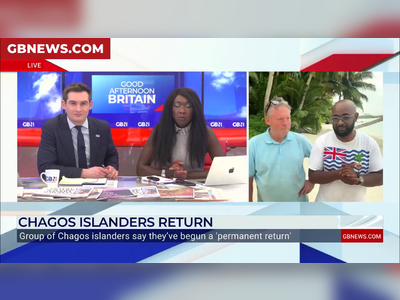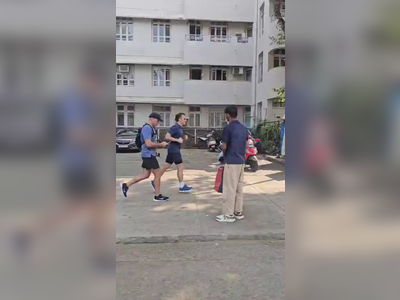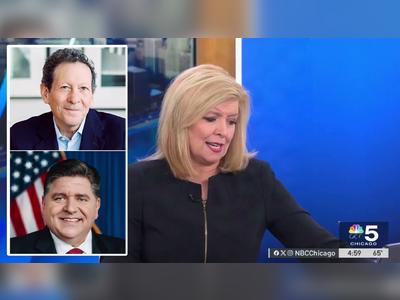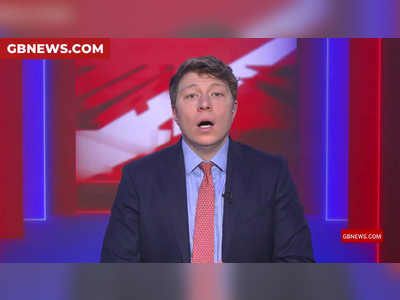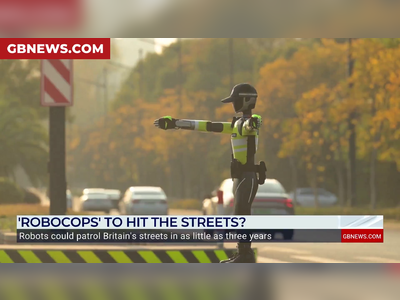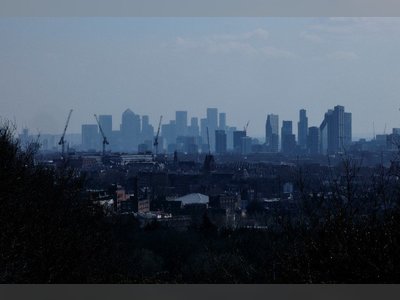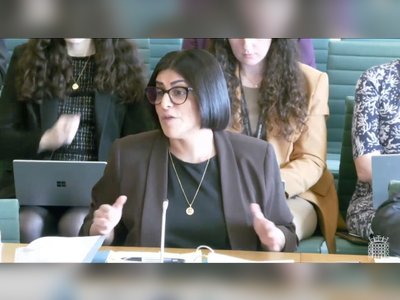
Why Britain's anti-immigration politicians are opening the doors to thousands of Hong Kongers
Full of bravado and often clad in black, the 21-year-old oversaw a group of 60 combative front-liners who embraced confrontational tactics against the police while demanding greater democracy in the former British colony.
Today, he is applying for asylum in the United Kingdom, and separated from his family in Hong Kong where he feels he can longer visit. Malcom believes if he returns to the Chinese city he could be arrested under a sweeping national security law imposed by Beijing on Hong Kong last June, which scaled up penalties against dissent to include punishments as severe as life imprisonment.
Since then, nearly 100 activists have been arrested under the new law. When Hong Kong police apprehended a protester friend of Malcolm's in October, he booked a red-eye flight to London. Malcolm asked CNN not to use his real name, for fear that his family -- who remain in Hong Kong -- could face repercussions.
The British government has called the security law a clear violation of the "one country, two systems" policy meant to ensure Hong Kong's autonomy from Beijing until 2047. In its wake, the UK has opened a six-year pathway to British citizenship for holders of British National (Overseas) passports (BN(O)), a special visa category created for Hong Kong nationals before the 1997 transfer of power.
The visa does not account for the most vulnerable Hong Kongers: young pro-democracy protesters, like Malcolm, who were born after 1997 and are therefore not eligible. But it is nonetheless remarkable in its scope -- in a city of 7.5 million people, 5.2 million Hong Kongers and their dependents are eligible for it.
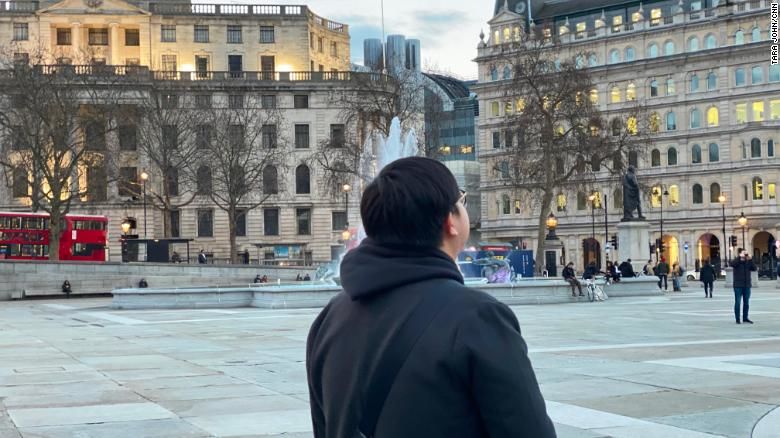
It's also remarkable for another reason: it has been pioneered by the same British politicians who engineered the UK's break from the European Union, in part, to curb immigration.
It sets a markedly different tone for the Conservative government, and its cheerleaders in the British press, who have spent the past decade pushing anti-immigrant policies. And critics say it is predicated on a flawed idea of Hong Kongers as a "model minority" who will need no support to settle into a new life in the UK.
A different tone
The UK voted to leave the European Union in 2016 following a campaign dominated by anti-immigration rhetoric -- much of it emanating from the same politicians who are now running the government.
In one campaign missive, pro-Brexit lawmakers Boris Johnson, Priti Patel, and Michael Gove stoked fears that rising numbers of southern European immigrants would "put further strain on schools and hospitals," and that "class sizes will rise and waiting lists will lengthen if we don't tackle free movement."
Yet last June, Prime Minister Boris Johnson announced the visa pathway for millions of Hong Kongers, describing the offer as being "one of the biggest changes in our visa system in history." The same politicians and media houses that warned darkly of an influx of foreigners during the Brexit campaign raised few objections this time around.
Last month, Priti Patel, now the Home Secretary, said she looked forward to welcoming Hong Kongers "to our great country." Yet in 2016, Patel campaigned against what she described as "uncontrolled migration" from the EU, and last year she is reported to have considered plans to send those seeking asylum in the UK to two Atlantic islands more than 4,000 miles away.
Welcoming Hong Kongers has become one of the few issues in British politics that commands bipartisan support, uniting opposition Labour, Green Party and Scottish National Party members with the hawkish, anti-China wing of the Conservative party.
The British government's shift in attitude could echo a change in public opinion -- migration concerns in the UK appear to have softened considerably in recent years. The jury is out as to why public attitudes have shifted, but it has coincided with immigration dropping off the agenda as a political issue in the past few years.
There is also a feeling of colonial "indebtedness" to the people of Hong Kong, says Jonathan Portes, a Professor of Economics and Public Policy at King's College London.
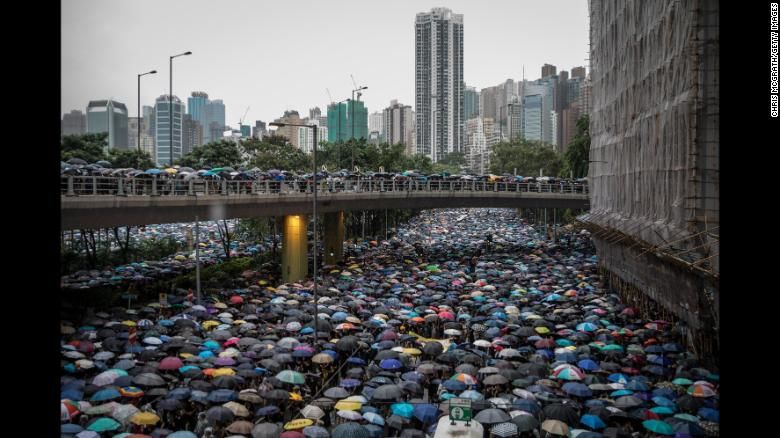
Some of Brexit's biggest backers are championing the scheme "in a pretty explicit break with the approach of [Margaret] Thatcher in the run up to 1997," Portes said, explaining that the late UK Prime Minister "wanted to limit, as much as possible, the number of Hong Kong Chinese who came here, because of her wider anti-immigration views."
Defending Hong Kong against the creep of authoritarianism has also become a moral issue in the UK, which has hardened its attitude towards China in the past year. The UK has barred Chinese telecoms giant Huawei from playing a part in the country's 5G network, and has been vocal in its criticism of Beijing for human rights abuses against Uyghurs and other minorities in the Xinjiang region.
Model minority
Perhaps one of the reasons the Hong Kong visa scheme has been so lauded is that its recipients are also being sold to the British public by hardline Brexiteers as a caricatured model minority, say critics.
Hong Kong nationals "wouldn't cost our taxpayers a penny... [they] would bring their own wealth," Conservative peer Daniel Hannan wrote in the right-wing Daily Telegraph newspaper. "And once they arrived, they would generate economic activity for the surrounding region, just as they did in their home city."
The Home Office estimates that up to 153,700 BN(O) holders will arrive in the country this year -- and estimates they could bring £2.9 billion ($4.1 bn) into the economy over five years.
Yet the reality might not be so clear cut.
Hong Kong has one of the highest GDPs per capita in the world, but it is also one of the most economically unequal places on the planet, where one in five people are estimated to be living in poverty.
A family of two adults and two children will have to pay as much as £12,000 ($16,600) in immigration-related fees and have more than £3,100 in the bank in savings, according to the UK Home Office, and that doesn't include flights.
The language barrier (forms will need to be completed in English), and having to demonstrate the ability to accommodate and support themselves for at least six months, are also likely to put some off.
"60% of the people in Hong Kong live in public housing estates and they would find it harder [compared to Hong Kong's white-collar workers] to settle in a foreign country," Chan added.
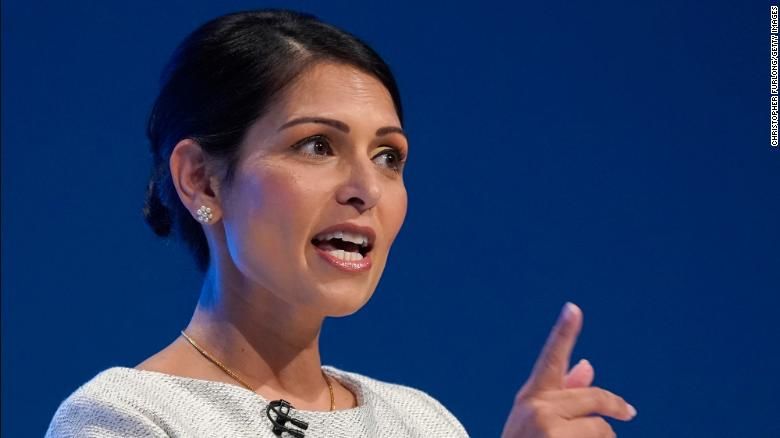
Nor is it straightforward for those who are able to scrape the funds together, campaigners say. A study by civil society group Hong Kongers in Britain found that the majority of people planning to take up the visa are highly educated and financially able to support themselves through the move. Yet their main concerns about the move are finding accommodation, living costs, finding a job, and integrating into British society. More than a quarter of those surveyed worried about having trouble communicating in English.
Another challenge is the support that awaits them when they arrive in the UK.
The UK does not have a formal national integration program for immigrants. And there is no nationwide integration plan for the Hong Kongers who emigrate under the new scheme, according to Fred Wong, who works with Hong Kong ARC, a civil society group which offers Hong Kongers legal and mental health support. Wong asked CNN not to use his real name because he still has family in Hong Kong and fears for their safety.
Some of the 40 Hong Kongers who Wong is currently helping in the UK have yet to finish university or high school, while around half have never held down a job before and are struggling to get on the ladder in the UK. The UK government has no provisions to help them find jobs, set up bank accounts, or access mental health support, Wong said.
"Most of them suffer from PTSD [post-traumatic stress disorder], which could be a reason or excuse [to why] they are not progressing," Wong said. His group has been organizing free psychological consultations and talks on how to overcome insomnia, nightmares and stress, as many of the Hong Kongers Fred helps have had trouble sleeping since fleeing the territory.
The model minority narrative means that the UK government is "unprepared, and maybe a bit oblivious to the amount of support that's needed," Wong said.
"The UK government is working alongside civil society groups, local authorities and others to support the effective integration of BN(O) status holders and their families who choose to make our United Kingdom their home," UKs Minister for Future Borders and Immigration, Kevin Foster, told CNN in a statement.
Support could shift
Polls show that the majority of British voters support the BN(O) scheme, but attitudes could shift as an estimated 300,000 BN(O) holders arrive in the next five years, Tanja Bueltmann, a professor of migration and diaspora at the University of Strathclyde, told CNN.
"The [ BN(O) scheme] is genuinely well meaning, but the provision around it is not very good," she explained -- something that raises questions over how many Hong Kongers will make the move in the end.
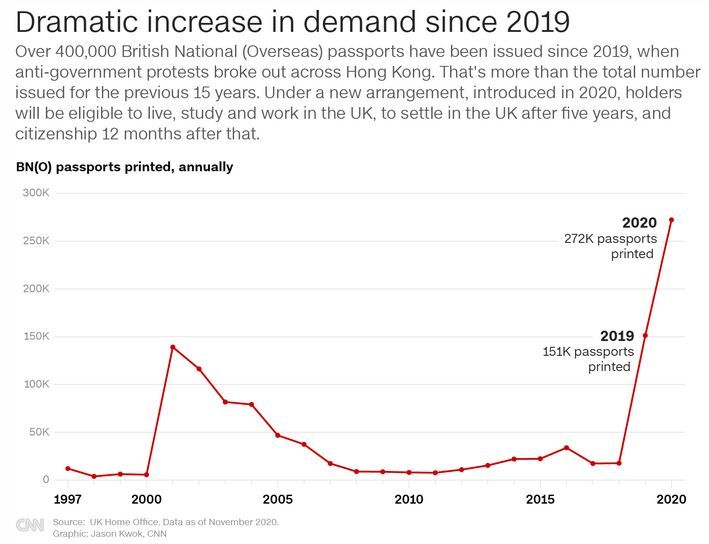
The other worry is Hong Kongers will face racially aggravated violence at a time of increasing xenophobia against people of East Asian appearance in the UK.
Figures from London's Metropolitan Police showed that people who self-identified as Chinese, and whose ethnic appearance was recorded as "Oriental," experienced a five-fold increase in racist crimes between January 2020 and March 2020. Polling done in June found that three quarters of people of Chinese ethnicity in the UK had experienced being called a racial slur.
During an October debate on racism against the Chinese and East Asian community in Parliament, Scottish National Party lawmaker David Linden said some of his constituents "described the attacks against them, with restaurants and take-outs being vandalized and boycotted and victims being punched, spat at and coughed on in the street and even verbally abused and blamed for the coronavirus pandemic."
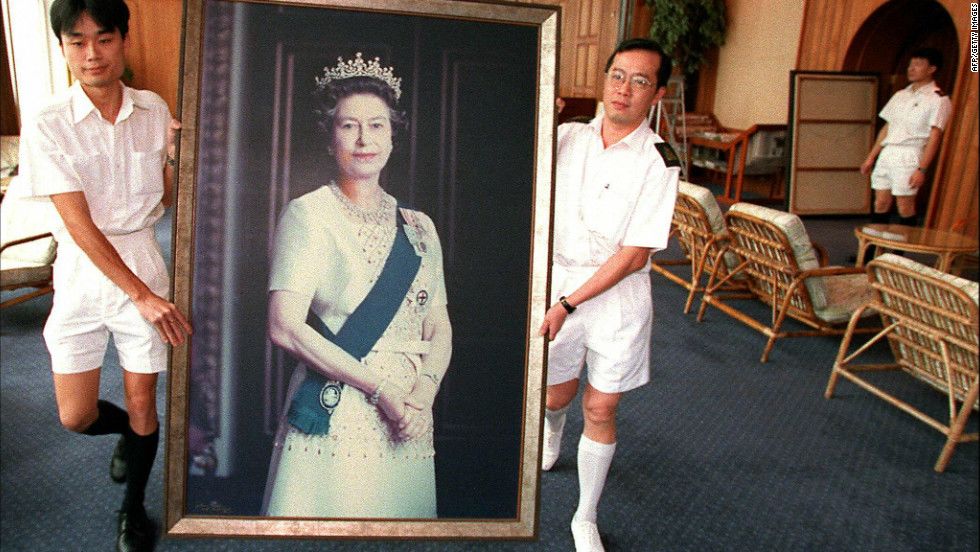
London-based Hong Kong Watch and 10 other civil society groups wrote to the government in January expressing concern about the lack of a "meaningful plan in place to ensure that the new arrivals properly integrate ... local authorities do not have specific policies, strategies or the creative bandwidth to welcome and integrate Hong Kong arrivals into their communities."
"The government must learn the lessons from past failures and take pre-emptive action now," their letter read.
'In limbo'
In the meantime, up to 350 Hong Kong dissidents between the ages of 18 and 24 are believed to be currently "stuck in limbo" in the UK, according to Wong from Hong Kong ARC. Being born after 1997, they are not eligible for the BN(O) scheme.
Some are in the country on tourist visas, biding their time until the UK government creates a policy that considers them, or until Canada begins its planned work-visa pathway for young Hong Kong dissidents. Australia has offered a pathway for permanent residency for Hong Kong students and skilled workers currently in the country.
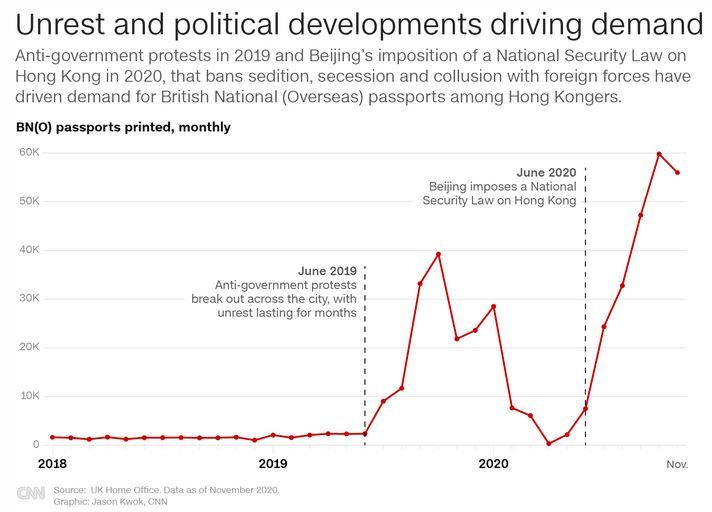
But pandemic-related travel restrictions, as well as a lack of funds, mean many have had to rely on the generosity of civil society groups for a stipend, food and even accommodation.
Others, like Malcolm, have already applied for political asylum in the UK. The process can take more than a year. Asylum seekers are not allowed to work or open a bank account while their claim is being processed; they will be charged higher international fees if they attend a UK university.
And campaigners say there is no guarantee that pleas for asylum will be granted. According to the Refugee Council, in the year to September 2020, only 49% of initial decisions by the Home Office resulted in a grant of asylum or other form of protection.
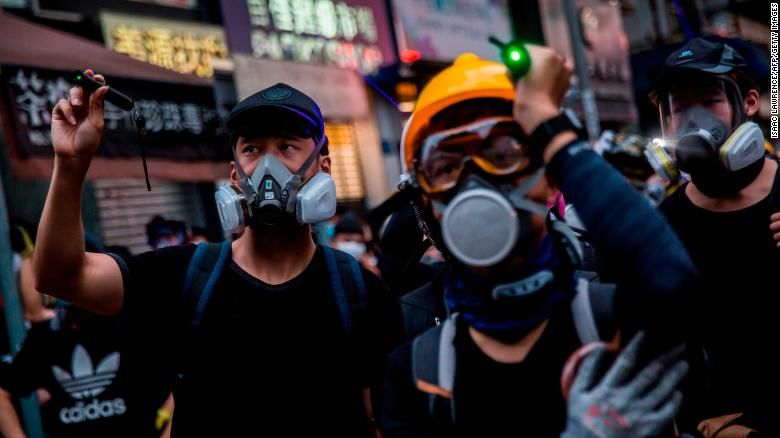
Many asylum-seekers instead have to rely on asylum appeals through the courts to provide them with refugee status.
"The pro-democracy protests would not have existed without them [young activists], and without the protests there would not have been the BN(O) scheme -- but they're the ones who are being left behind," said Chan.
Malcolm says he is luckier than most, having a sizeable inheritance to survive on, and a network of contacts that helped find him accommodation outside London. He hopes to apply for college once he gains asylum, but in the meantime has started to financially support around 20 dissidents in the UK and Hong Kong. He says that the British government has not done enough to help his generation.
'Practice makes perfect'
Hong Konger Sze, who asked CNN not to use her full name because her family still lives in Hong Kong, quit her job as a high school geography teacher and came to the UK in October on holiday to visit some friends.
At the end of her two-week trip, Sze decided to stay. She told CNN she plans to apply for BN(O) visa at the end of this month and is living off her savings in a flat she rents with a friend in North London in the meantime. Sze has been looking into roles as a geography teaching assistant or tutor as her Hong Kong teaching qualifications are recognized in the UK. When asked if her halting English will be a liability, Sze says "practice makes perfect."
The 28-year-old said China's incursion into everyday life in Hong Kong had influenced her decision to stay, as had the fact that being in the UK means she has the "freedom to do what I want and even protest every week," without fear of political retribution.
It would be intolerable to live in Hong Kong now, especially since teachers have been compelled to "teach students about the [national] security law," she said.
Sze has settled into London life: She already has strong opinions on the snail's pace of London buses and is counting the days to when lockdown ends and she can go shopping on Oxford Street.
While it can be hard to find the authentic Cantonese cuisine she grew up eating in Hong Kong, Sze marvels at how much cheaper food is at British supermarkets.
"The food quality is better, the price is cheaper and the rent is cheaper," she told CNN.
Sze cannot get a job until her BN(O) visa is approved, but she is optimistic that the UK's coronavirus-induced economic slump will not get in the way of her finding work. "I am open to any [job] option -- it really depends on how much savings I have," she said.
But her biggest concern is the fate of fellow dissidents going through the asylum process, and whether her compatriots who move to the UK will give up the fight for independence back home.
"Hong Kongers should never give up, no matter if they've left Hong Kong or not," she said.
